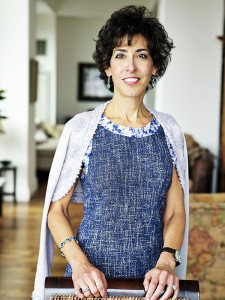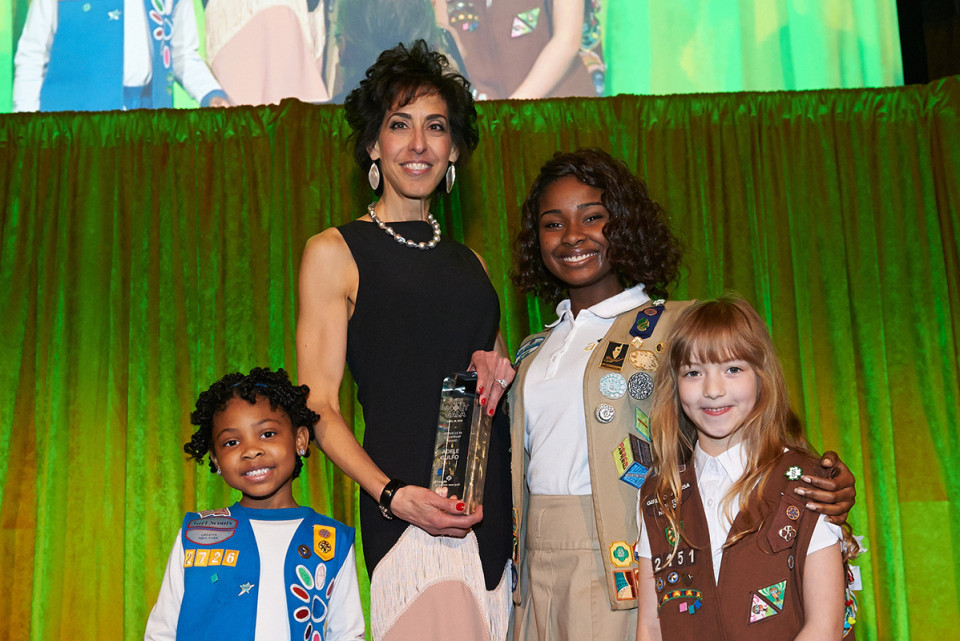Sound Advice from Adele Gulfo, Mylan, Inc.’s EVP and Chief Strategy Officer
Long before she became the Executive Vice President and Chief Strategy Officer of Mylan, Inc., Adele Gulfo was a research scientist in a laboratory. She had always known she wanted to study Biology and work in science, but early in her career, she did not see herself aspiring to such a role in the corporate sector. In spite of the fact that she had always known she wanted a career in some scientific area, Gulfo later learned there were many more options available to her than those she was exposed to as a girl or young woman.
Gulfo exlained, “there is truly a lack of knowledge and education about what is out there for girls.” That lack of knowledge is a big reason why Gulfo actively donate her time to several organizations to encourage and educate young people about the wealth of possibilities before them. Her involvement with Girl Scouts of Greater New York’s robotics program recently earned her honors as a role model at their annual Girl Scout Gala on April 29, 2015.
Gulfo also speaks at the pre-med program at her Alma Mater, Seton Hall University, as well as to MBA programs across the country to expose young women, and men, to the options they have and to encourage them to keep an open mind. When asked, “What do you wish you had known when you were younger? Gulfo replied, “Younger in my career, I think I would have benefitted from having a bit more exposure to the possibilities. I knew I loved science and I thought that the path was pretty much doctor, dentist, vet or scientist in the lab, and I never really understood the business of science. I didn’t know it existed.”
Illuminating the Possibilities
Gulfo thinks we should exposure young women to more of the possibilities before them. “There is so much…think about the amount of science that is progressing in the biology of disease and trying to figure out more precisely how we identify and treat disease…this whole notion of precision medicine,” said Gulfo. She predicts there will be much more individualized treatment of disease with the ability to determine how a specific person will respond to treatment based on their particular biology. She explained that genetic analysis is used already in the cancer fields, but it will extend to other diseases and treatments in the near future. Gulfo believes this frontier will provide many opportunities for women and men.
You can tell from Gulfo’s voice that she is passionate about STEM. She excitedly explained how big data and science intersect—one of the areas in which STEM education gives girls and women a huge opportunity. Once researchers gather information about diseases and personal genetics, Gulfo said, “You need big data to analyze the data and predict the optimal solutions to treat these diseases.”
Foundational Education
Gulfo advocates for foundational education in STEM because these subject matters train the mind and provide discipline that works in any career—business, government, not-for-profits, global careers, careers in the U.S. or careers in specific markets outside the U.S. “It’s all about skills and foundational experiences early in life,” explained Gulfo.
“I’m never bored. I’m constantly challenged with the changing dynamics that are out there,” Gulfo stated. She sees opportunities for women to merge their interest in science with businesses that will change how people live. She cited an aging population focused on health and quality of life as an example where changing needs will create additional jobs in which women can excel. “As Chief Strategy Officer, part of my job is to always be thinking about how healthcare is changing and to provide better solutions to the patients that we reach. This is because, at Mylan, our mission to set new standards in healthcare and to provide 7 billion people access to high quality medicines.”
Nature or Nurture?
If we are going to fill all the jobs that an increased demand for science and technology is creating, we must encourage coming generations and women in transition to prepare themselves for opportunities. Some people, like Gulfo, naturally love science. Gulfo admitted she didn’t love to read storybooks as a child, instead preferring to solve problems and master anything having to do with math and science. Although nature might have made her naturally gravitate toward science and math, nurture, she thinks is very important, especially for women.
The merging of nature and nurture is one reason Gulfo thinks programs like that of Girl Scouts of Greater New York’s robotic program are so important. She said, “They are actually building robots and figuring out how to make them work…they could still make their robots feminine (many decorated them with pink ribbon and other items to make them look feminine) but they were making robots.”
She cited studies demonstrating that boys and girls express equal interest in STEM at an early age – “that’s the nature part of it,” says Gulfo. However, boys are more readily encouraged to pursue STEM fields – “that’s where nurture comes in, and we all have a role to play in stoking the interest that girls have in STEM fields when they are young, so that they have the opportunity for rewarding and high paying STEM careers later, just as boys do.”
Another way to nurture girls’ interest in STEM is to make it challenging. “The more challenging the task is at a young age and the more struggle to figure out a way, that’s what builds the confidence,” Gulfo said. “Having that innate confidence that you can solve it, that you can figure it out and if you don’t know the answer, you know how to get it, and you can rely on your teammates to help you…All of this translates into so many life experiences that will help you in your career.”
We can all help close the gap and encourage more women into STEM careers by shining a light on the programs that do exist to promote women in STEM.”What I see is that the programs are out there,” Gulfo said, “but they are not pervasive enough. They are not as pervasive as Kim Kardashian or Hollywood.”
When it’s Time for a Change
“First know thyself,” Gulfo advised. If you are in a science career, as Gulfo was and you are happy with your face in a microscope in a lab, fantastic. However, if your passion, or exposure to something different, tells you that you might be better off moving into another career, keep the faith. Gulfo began her career in research for higher learning institutions and hospitals, but exposure to the commercial side of research made her desire a career change. The transition, as it was for Gulfo, is often not easy, she said, “Once you are considered a scientist; you’re not considered a business leader.”
Devise a Strategy
Getting people to see you as a serious contender in a different field requires some strategizing. She explained that it is always easier to assess your strengths and weaknesses and create a plan to fill in the gaps. Wherever you are, if you realize you are at a crossroads or you want to make a career change, as a scientist, I say, dissect the problem. Where are you, and where do you want to go? What are the gaps you have? What are the experiences you are lacking? Figure out how to fill those gaps. Then, go for it.” You fill in the rest, Gulfo believes, with your passion and determination.
Gulfo said, “You have to demonstrate your ability to learn, and you have to demonstrate your commitment.” The first thing Gulfo did when transitioning from research science to the business of science was go back to school for an MBA. She had not taken any business classes in her undergrad program, and she recommends first getting the education to help you advance.
Broaden Your Experiences
Once you have the knowledge and skills, “Take on projects in the area you want to be in, not the area you are in,” Gulfo said, “Seek opportunities and projects outside your particular area or organization. That’s where mentors and sponsors come it.”
Obviously, Gulfo reminded, you have to maintain excellence in your own position while taking on other roles, but an opportunity to prove yourself “gives you an opportunity to add value in the area you are most passionate about.”
Keep the Faith
You won’t always be an overnight success. In most cases, a woman may work for years toward a career goal, Gulfo said, “when you’re in it, everything seems to take so long.” She suggested that as you are learning, growing and transitioning in your career, working “in an area you love to serve will make the wait easier.” That’s solid advice for women at any age.
Tackling the problem (of career change) in a methodical way allows you to generate a checklist and mark things off the list as you move your career forward. “Everyone likes to make progress,” Gulfo said, “and you can say to yourself, ‘Okay, I am ready for the next step.’” Getting some quick wins along the longer path to achieving your career goals will help you keep your momentum.
If at first you don’t “know thyself,” try again. Learn more things and enhance your experiences until the picture of who you are and what you represent becomes clear. Imagine how the next generation might approach their careers, how well they might know themselves, if we each invest some time, as Adele Gulfo does, to enlighten them to the endless possibilities before them.
 Interviewer Interview Prep
Interviewer Interview Prep Impactful Mentees
Impactful Mentees Benefits of a Mentor
Benefits of a Mentor Advice for First-Time Managers
Advice for First-Time Managers Overcoming the 18-month Itch
Overcoming the 18-month Itch Dressing for Your Style
Dressing for Your Style Interview Style Tips
Interview Style Tips Women's Stocking Stuffers
Women's Stocking Stuffers Gift the Busy Traveler
Gift the Busy Traveler Father’s Day Gift Guide
Father’s Day Gift Guide Airport Layover Activities
Airport Layover Activities Traveling & Eating Healthy
Traveling & Eating Healthy Travel Like a Boss Lady
Travel Like a Boss Lady The Dual California Life
The Dual California Life Gifts for Thanksgiving
Gifts for Thanksgiving Summer Reading List
Summer Reading List Top Leisurely Reads
Top Leisurely Reads New Year, New Books
New Year, New Books Life Lessons from a Sitcom
Life Lessons from a Sitcom Oprah, Amy or Amal?
Oprah, Amy or Amal?






